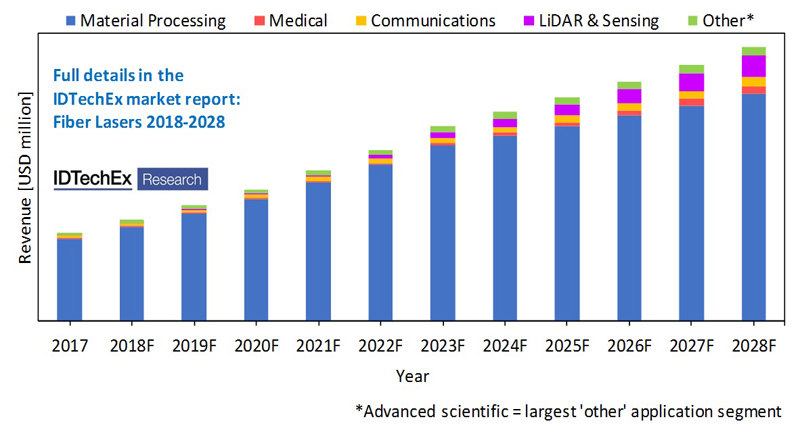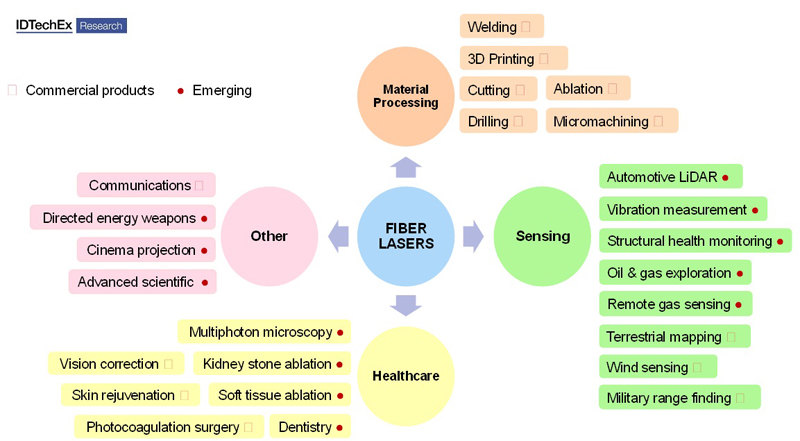Analyst firm IDTechEx forecasts global fiber laser system sales will reach $8.9 billion in 2028.

Upward trend: Global fiber laser market forecast indicating growth of key market segments
Emerging fiber laser technologies are expected to make significant market progress in sensing and healthcare, while innovations in laser welding and 3D printing mean that material processing remains as the primary market focus in the medium term. These are some of the key conclusions of new market analysis published by research company IDTechEx.
IDTechEx notes, "Fiber lasers are compact and energy efficient laser systems that offer the best beam quality for applications where precision is important.
"As this technology is based on an optical fiber, the absence of free-space optics and mechanical components provides excellent system stability and long product lifetime. Directing the laser radiation to the point of application via an optical fiber ensures safe operation for humans and simplicity of integration into robotics."
Therefore, the analyst expects that in a diverse range of industries, replacing conventional laser or non-laser technologies with fiber lasers can maximize process speed and precision while minimizing operation costs. Some examples of end-user industries that can benefit from the adoption of fiber laser technologies are highlighted in the graphic, below.
Inside a fiber laser, rare-earth metal dopants function as the gain medium and determine the output wavelengths: 1μm, 1.5μm and 2μm are the common infrared wavelength bands optimized for fibre laser applications in material processing, sensing and healthcare.
Mid-IR supercontinuum (broadband) laser sources and visible light frequency-multiplied laser sources are also available for specialist applications in sensing and healthcare, respectively. IDTechEx notes that "Fiber lasers can easily achieve multi-kilowatt average output powers or function as ultrafast pulsed energy sources depending on the system architecture."

Addressable markets
Materials processing: sustained progress and innovation Fiber lasers have a large share in the laser material processing market. However, ongoing technology innovations led by key suppliers such as IPG Photonics (USA) enable fiber lasers to further replace competing laser and non-laser technologies.
Based on extensive discussions with industry experts when researching the new report Fiber Lasers 2018-2028: Technologies, Opportunities, Markets & Forecasts, IDTechEx has concluded that recent advances in fiber laser welding and 3D printing are highly important to lightweighting in automotive and aerospace manufacturing.
Sensing Commercial applications of fiber lasers in sensing are typically limited to high-precision LiDAR for terrestrial mapping, range finding and wind sensing. IDTechEx has identified significant evidence of key players preparing to enter the automotive market by optimizing fiber laser LiDAR for autonomous vehicles. IDTechEx also expect emerging fiber laser technologies to have a significant impact on gas sensing and structural health monitoring within the next decade.
Healthcare Fiber lasers can offer wavelengths that are an excellent match to novel fluorescent markers and biological molecules. Key players collaborate with research institutes to optimize fiber laser systems for applications in biomedical imaging and medical surgery. IDTechEx have identified several emerging technologies that are expected to enter the healthcare market segment within the next decade.
$8.9 billion sales value in 2028 In the new market report, Dr Nilushi Wijeyasinghe explores how recent fiber laser technology developments affect the growth of key market segments. She draws on her research experience in laser physics and materials physics in the discussion of novel technical concepts.
She commented, "The advantages and challenges associated with technology trends are assessed to provide a balanced outlook on market opportunities, and recent progress is highlighted using case studies. Market forecasts are based on the extensive analysis of primary and secondary data, combined with careful consideration of market drivers, restraints and key player activities."
source:Optics.org




